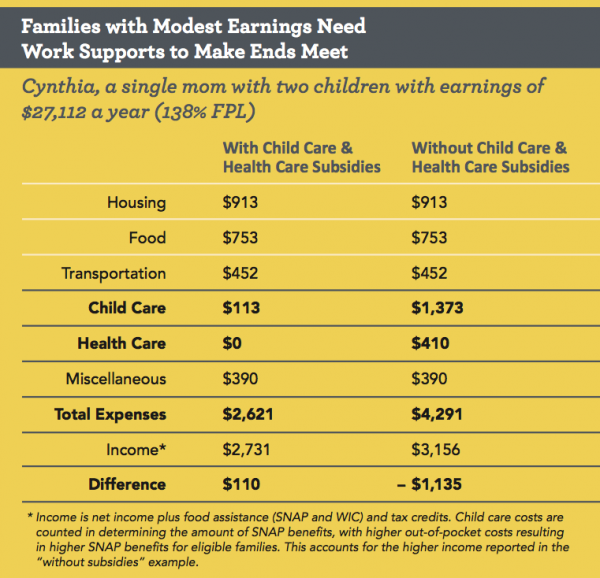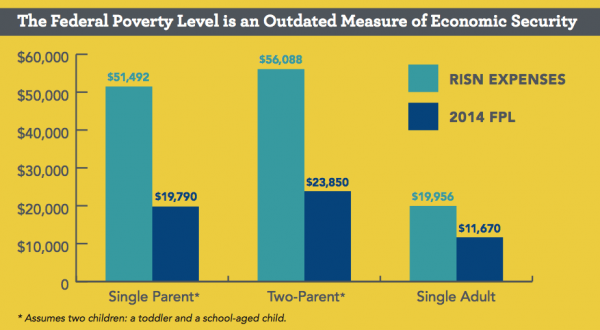
Robin is an employee of a chain pharmacy here in Rhode Island who was required to work during Tuesday’s blizzard, from 11am to 7pm, or risk losing her full-time status. To protect Robin, I changed her name and won’t mention the name of the store.
She lives about a 15 minute walk away from the store at which she works. She doesn’t own a car, but sometimes her boyfriend might drop her off or pick her up. But of course, on Tuesday morning the streets were impassable by car or by foot. So her manager asked her to grab a shovel and dig her way to work through the snow.
“The manager wanted us to be at the store and wait for the pharmacist to open,” she told me. “He wanted us to shovel our way into work.”
The manager, who worked from home, wanted the store opened at 8am. To her credit, Robin told her manager that his plan “wasn’t happening.” The manager contacted the plow company and got the parking lot cleared. By that time the streets were plowed enough for Robin to walk to work. Her 15 minute walk took about 40 minutes.
“It was miserable,” Robin said, “and absolutely dangerous. There were plows everywhere and the sidewalks weren’t shoveled. I could have had my boyfriend drive me, but there was driving ban and I’m not on the exempt list.”
In Governor Gina Raimondo’s Executive Order restricting motor vehicle travel throughout Rhode Island, health care and pharmacy workers were exempted from the ban.
“I’m technically not a pharmacy worker,” said Robin, adding that in her opinion she, “could have been arrested.”
It turns out that the chain pharmacy corporation is quite clear with the employees as to who is a pharmacist and who isn’t. There are all sorts of rules governing the operation of the pharmacy, keeping it distinct from the operation at the front of the store. Of course, a case could be made that the front of the store operation was providing “critical services to the public,” and therefore be exempt from the governor’s order in much the same way as might a grocery store or hardware store, and I doubt any police officer would have bothered to arrest Robin if she told them she was on her way to her job at the chain pharmacy. But just as Robin isn’t a pharmacist, she’s also not a lawyer. And she can’t afford to risk a ticket she can’t pay.

It wasn’t a busy day, of course. The majority of Rhode Islanders were doing what Robin’s manager was doing: staying home and waiting for the storm to be over. “I must have gotten a hundred phone calls asking if we were open,” said Robin, “but by the time we closed at 7pm we maybe had 20 customers in all.” The customers were looking for chips, candy, soft drinks and other junk foods.
The pharmacist didn’t have a single customer all day.
After closing, Robin walked home. The blizzard had abated somewhat, but the snow was still coming down and the wind was still kicking up powdery snow. “The roads were a little better, but it was still freezing and slippery,” Robin told me. Of course now it was dark, and the plows were still out and the sidewalks still needed shoveling, so Robin was walking in the street again. She finally arrive home at around 8pm.
For her trouble Robin made about $72 on Tuesday, before taxes and insurance. I asked her if the experience was worth the money. Her answer was blunt.
“No. It was uncalled for,” Robin said, noting her co-workers felt the same way. “No one was happy. We were all extremely disappointed that no one cared about our safety.
Robin

Robin is in her early twenties and has worked at the chain pharmacy store for about four years. In December of last year she was making $8.75 an hour but when the minimum wage was increased to $9 in January, she found herself making 25 cents an hour more, the same as all the new hires. Robin has a high school diploma, and no college.
She lives with her boyfriend, and they split the rent and utilities, though he makes slightly more than she does. Because she and her boyfriend combined make enough to eke by, she considers herself middle class, but if she were on her own she wouldn’t be able to afford the rent on her apartment and would be poor.
“I can’t afford to live on my own,” she told me. Robin has worked since she was 16 and has never been on any kind of public assistance.
Because Robin is technically a full time employee, she is entitled to healthcare under the rules established by the chain pharmacy corporation. The cost of the healthcare is about 25 percent of her take home pay when she works 40 hours a week, but since the new year began all employees have had their hours cut and Robin’s been averaging 30 hours a week, if she’s “lucky.” 30 hours is the minimum amount she has to maintain to keep her full time status and her healthcare.
The technical title for Robin’s job is “Customer Service Representative” and her duties include helping customers locate items in the store, running the register and restocking shelves. When new people are hired their training technically is the responsibility of the store manager or a shift supervisor, but often the training falls on Robin, due to her four years of experience.
I asked Robin if she likes her job.
“No, not really,” she replied, “but I like some of my co-workers, especially the people who were there when I started. I love them.”

Some of Robin’s complaints about her boss are perhaps typical. “He’s not very shy about letting you know that he’s not fond of you. He micromanages and he doesn’t recognize good work. He only tells you when you’re doing a bad job.”
Others are indictments of the company’s business model. “He cut everybody’s hours down so that pretty much everybody is at part time. Then he hired a bunch of new people and we’re all fighting for hours.”
Some say if low wage workers don’t like their jobs, they should find jobs that pay more, or get an education and find better jobs. So I decided to ask Robin why she doesn’t do these things.
“It’s not as easy as you might think it is,” she answered. “I don’t have a great education, I don’t have transportation… I know it’s possible, I can go back to school, but people think it’s so easy to go back to school. Get loans. Get grants. But it’s a lot of hours and a lot of work and I’d have to cut down hours at my current job and I’d have less money. Plus I’d be paying for school.”
I asked Robin if she thinks the minimum wage should be raised to a living wage, like $15 an hour. Her answer shouldn’t have surprised me, but it did. “I know that there’s a lot of things that come with an increase in minimum wage. When you increase minimum wage, other things increase as well.”
I told her that a study just came out from UMass Amherst that purports to show that the price increases of goods in the event of an increase in the minimum wage would be modest.
Robin had never heard of this study, which is unsurprising, given the sparse media coverage given to economic reports that play against conservative business interests. Instead, she was parroting the accepted “wisdom,” a narrative that conveniently prevents employees from demanding fair and just compensation for their work.
Robin does think that there should be a law mandating double time for hourly employees who are forced to work during official declarations of disaster. Being paid fairly would help make her feel more appreciated. “This sounds a little selfish, I guess,” said Robin, “but if I were getting something extra, I’d be more willing to be there, and I wouldn’t be so upset and disappointed with my job.”
]]>
READ THE FULL 2014 EPI “RHODE ISLAND STANDARD OF NEED” REPORT HERE
A Rhode Islander with no children needs to earn $11.86 hourly – almost $3 more than what the state minimum wage will increase to next year – in order to afford “a no-frills budget that includes the costs of housing, food, transportation, health care, child care and other necessities such as clothing, toiletries and telephone service,” according to the new report. About 36 percent of single adults in the Ocean State earn less than this $24,666 annual threshold, according to the new EPI report.
A two parent family with two young children would need to earn $30 an hour to make ends meet, says the report. In other words, if each parent worked 60 hours a week at a minimum wage job the family would still fall about $3 an hour short of making ends meet.
According to the report, only 27 percent of all jobs in Rhode Island pay enough for a family with two children to survive on. “Child care and health care subsidies, tax credits, and nutrition assistance make a significant difference for families when wages aren’t enough,” it reads.
“Rhode Island is a beautiful state with sandy beaches, world class restaurants, and a vibrant arts and culture scene,” according to the report. “Yet many workers in our state struggle just to pay for the basics, making it all but impossible for them to enjoy all that our state has to offer. In fact, many workers would not be able to get by if not for government funded work and income supports that help close the gap between earnings and expenses.”
The report, it says, “demonstrates how work supports like food assistance, tax credits and child care and health care subsidies help close the gap between income and basic expenses.”
It uses the hypothetical example of a local bank teller to do so:
“Cynthia is a single mom of eight-year old Sam and Emma, aged two and a half. Cynthia works as a bank teller and has annual earnings of $27,112. The health insurance offered through Cynthia’s employer is unaffordable, but fortunately she is able to enroll her family in RIte Care Health Insurance at no cost. She also quali- fies for help paying for full-time care for Emma and after-school care for Sam which together costs $1373 each month. Based on her income, Cynthia’s co-pay through the Child Care Assistance program is $113/month. Without these child care and health care subsidies, Cynthia’s basic-needs budget would be in the red $1,135 every month. With these subsidies, Cynthia is able to meet her basic expenses with $110 left over.”
 The EPI report stresses that the Federal Poverty Level is no longer an accurate barometer of poverty.
The EPI report stresses that the Federal Poverty Level is no longer an accurate barometer of poverty.
READ THE FULL 2014 EPI “RHODE ISLAND STANDARD OF NEED” REPORT HERE
]]>

